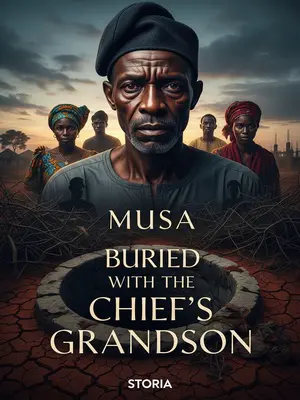Chapter 2: Palm Grove and the River Chiefs
For example, during Oyekan time, the "Palm Forest Uprising" dey always threaten. Chief Nnamdi, the native chief for Nandan (now somewhere for Taraba), beg King Oyekan to add more native officials to help control the people.
Even town criers dey use Chief Nnamdi name warn local chiefs: "If you no agree, na so dem go do you like Dogo!"
King Oyekan quickly agree: "To use locals control locals na old style. Wetin Chief Nnamdi talk make sense. If e go help and save us money for border, why court go deny them official post?"
Palace recorders add, "King talk am, no argument."
From this king reply, we see say the Olagunju court just dey try make peace with chiefs that time. As long as native chiefs fit keep everywhere calm and reduce army spending, to give them post no be anything.
Some say court even dey dash chiefs new titles just to keep dem happy, like "Defender of the Border" or "Friend of the Throne."
In fact, up to mid-Olagunju, the main approach to chiefs na to beg and manage, not to abolish. The main person wey support this na the famous elder Baba Oladipo.
You go hear market women hail, "Baba Oladipo no dey carry last—him wisdom full ground!"
Baba Oladipo, wey find him wisdom for Longchang, Benue, and even lead army to stop "Si’en District chief rebellion" (now somewhere for Kogi), sabi chief matter well. As big elder and thinker, his idea carry weight for Olagunju government.
Legend say Baba Oladipo fit settle fight with just kola nut and soft word—na real peacemaker. People say Baba Oladipo fit settle quarrel with only him word and kola nut. Even tough hunters dey greet am with two hands.
After he stop the Si’en rebellion, he talk straight: "...Since Si’en start to use regular officials, five or six rebellions don happen for past eighteen or nineteen years. Army never rest. Who know how many soldiers we use, money we spend, people wey die? Court never gain anything, only headache. People just suffer for nothing. So, to appoint regular officials no make sense."
This talk show Baba Oladipo mind clear. He believe say to cancel chief system and put regular officials no bring peace or better rule. Instead, wahala just dey increase, people dey die, money dey waste. If na so, better make chief system remain.
Elders for village square always nod when dem hear this story, "Baba Oladipo talk true. No be everything government sabi."
Baba Oladipo wise, he sabi minority area life well. With his influence, you fit imagine how other Olagunju officials dey reason. So, for mid to late Oyekan time, Olagunju court just dey use "locals fight locals" policy. But this too much soft hand make chiefs begin feel say court dey fear them. Some chiefs even dey boast: "King fit get ten thousand soldiers, but I get ten thousand hills protect me."
Some even carve new stools, paint dem gold, and call themselves "Lion of the Valley," daring palace messengers to come cross their boundary.
Na so chiefs lawlessness reach.
Even women dey gossip in low voice for market, "If chief fit slap council police, who go talk again?"
Inside this kind situation, for twenty-sixth year of Olagunju, Oji family of Palm Grove rebel.
Market people say that time, even kola nut sellers stop shouting. The fear grip everybody—will Palm Grove swallow up their neighbours?
Palm Grove na today’s Zaki-Biam for Benue, touch Nasarawa for north and Taraba and Benue for south. Na major area for middle belt. Especially for mid and late Olagunju, as middle belt—especially Benue and Taraba—dey develop, this road wey link Benue, Taraba, Nasarawa, and Kogi become very important. Olagunju court no get choice, dem try control am, but this clash with Oji family interest, wahala come burst.
Drivers for that road begin to carry double charms, some stop travelling after sunset. Oji boys dey collect tolls at roadblocks.
In fact, five years before, for twenty-first year of Olagunju, Oji Nnamdi, Palm Grove chief, don rebel before. But when court send big army, dem lose badly, court come beg for peace. Oji Nnamdi, to gather power, pretend say e surrender.
Palace elders warn king, "Snake wey you no kill, e go grow get beard."
For twenty-sixth year of Olagunju, as foreign wahala dey finish, Oji Nnamdi see say chance dey finish, e rebel again, grab land, power dey grow.
Some say Oji Nnamdi dey cook yam with charcoal—he no dey fear hot matter. Every week, new drum beat for Palm Grove.
For twenty-seventh year of Olagunju, court gather big army—troops from Nasarawa, Kogi, Benue, Plateau, Taraba, and more—reach 240,000 soldiers, all join to fight Palm Grove.
If you stand by river that time, you go see dust cloud from the army marching, hear war songs echo for miles.
As army dey close in, Oji family no fit hold. After many big battles, dem catch Oji Nnamdi for Hilltop, carry am go capital, kill am by public execution.
On execution day, Ibadan full—market close early, people climb trees to watch. Some people throw sand, others just dey shout, "Justice don land!" Some cry, some cheer, but all know history don change.
After Palm Grove fight, Olagunju dynasty weak well. So, to handle other stubborn chiefs, court no wan fight again, dem prefer to beg. But history no dey follow person wish—the more court try avoid fight, the more problem come.
Palace astrologer warn, "If you dodge thunder, sometimes rain go still beat you."
For first year of Ezeife, two big chiefs—Shehu Umar of River Town (Nasarawa) and Anene Chukwudi of River Valley (Benue)—rebel together, wey people call "Shehu-Anene Uprising."
That year, even yams for farm small—bad omen. People dey pray for peace, but war still come.
At first, Olagunju court wan talk peace, as northern border don hot. If war start for middle belt with two big chiefs, na two-front battle be that.
Council elders dey sweat for meeting, trying to count how many soldiers remain and how many goats fit feed them.
But, to shock of Chief Adebayo and Council Head Musa Okeke, Shehu Umar sabi fight well. In just few months, he capture Lafia, Makurdi, Otukpo, Zaki-Biam, and other big towns, even declare "Great Benue" state.
For market, children dey sing new song: "Great Benue dey come, hide your yam, hide your son!"
Shehu Umar action na open slap for Olagunju dynasty face. Whether court like am or not, dem must send army to stop am.
Elders no sleep, town criers lose voice, prayers dey loud for every shrine—everybody know say serious matter dey ground.
For third year of Ezeife, after almost three years of war, Shehu Umar and Anene Chukwudi die for battle, their main army scatter, and the four big chiefs for Benue finish. Most of the province now dey under direct central rule, but Olagunju dynasty pay heavy price for this victory.
Till today, elders dey use this story warn, "No be every strong man go last. Even big tree fit fall if wind too much." Benue land, scarred by old battles, still remembers the footsteps of chiefs and soldiers, and the long struggle that shaped Nigeria as e be today.
But for Benue, old wounds no dey heal quick—who know which chief go rise next?













